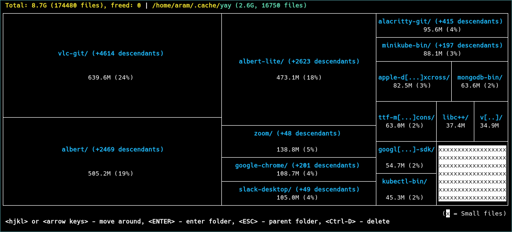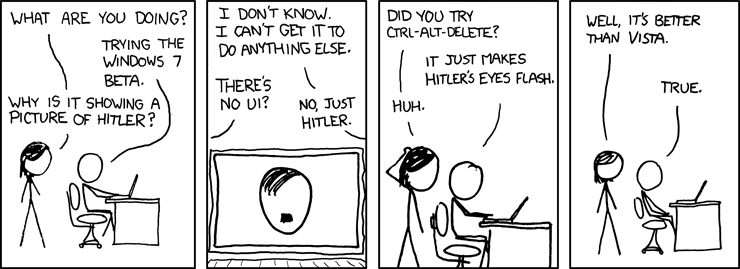- 5 Posts
- 39 Comments

 91·6 months ago
91·6 months agoOh nice. gdu really is ncdu, just faster (on SSDs).
Link for lazy people: https://github.com/dundee/gdu

 2·8 months ago
2·8 months agoYeah, idk, ive never actually used win 11 and have barely used win 10. It just a meme.

 131·9 months ago
131·9 months agoThat’s a valid argument, but a very weak one. If we are not completely sure something is an improvement in all aspects are we just to dismiss it altogether?
They’ve lost potential revenue, but that is not the same as if amazon would come to their house and had stolen their only rucksack prototype.
Potential revenue is not your property.
It still sucks though.
It works great for a closed group of people, all on one instance. Another data point that federation is hard.
Can you expand on this wild claim? The whole point of containers is isolation so what you are saying is that containers fail at that all the time?
That’s cool, post a link here when you’re done, I want to see what you cook up.
Good, we have been in a drought of js frameworks lately: https://dayssincelastjsframework.com/
Joking aside, that’s your selling feature?

 6·11 months ago
6·11 months agoI use rathole for this purpose. Works great, minimal, great performance.

 5·11 months ago
5·11 months agoWell, lemmy is a place for much more cultured audience. We can appreciate a good shitpost (that does also hold some water).

 9·11 months ago
9·11 months agoThis is an overstatement, definitely. C is one of the few (mainstream) languages where memory safety vulnerabilities are even possible. So if you batch C and C++ together, they probably cover more than 90% of all the memory unsafe cove written in last 50 years, which is a strong implication that they will contribute to 90% of memory vulnerabilities.
All that said, memory vulnerabilities are about 65% of all high implact vulnerabilities on Chromium project[1] and about 70% of vulnerabilities at Microsoft [2].
You are not alone. This is the work git was built for.
There is a bit of benefit if you have code reviewed so separate commits are easier to review instaed of one -900 +1278 commit.

 2·1 year ago
2·1 year agoMy house was built in 1939. Initial installation of ecectric cables consisted of a wire in a sleeve filled over with concrete. That was all replaced with proper tubing and isolation, but these few outlets do not have ground.

 4·1 year ago
4·1 year agoWait, but if you have, for example an HTTP API and you listen on a unix socket in for incoming requests, this is quite a lot of overhead in parsing HTTP headers. It is not much, but also cannot be the recommended solution on how to do network applications.

 1·1 year ago
1·1 year ago

 511·1 year ago
511·1 year agoWhat’s DRM in this context? Surely linux kernel doesn’t do digital rights management?

 12·1 year ago
12·1 year agoI use planka, which feels exactly like what trello used to feel: fast & simple. It does not have an app though.




I use docker to package and deploy my website. When it is compiled to HTML, I place it into a docker container that is based on nginx.
This container is now easily ported to production server and ran to serve the HTML over HTTP.